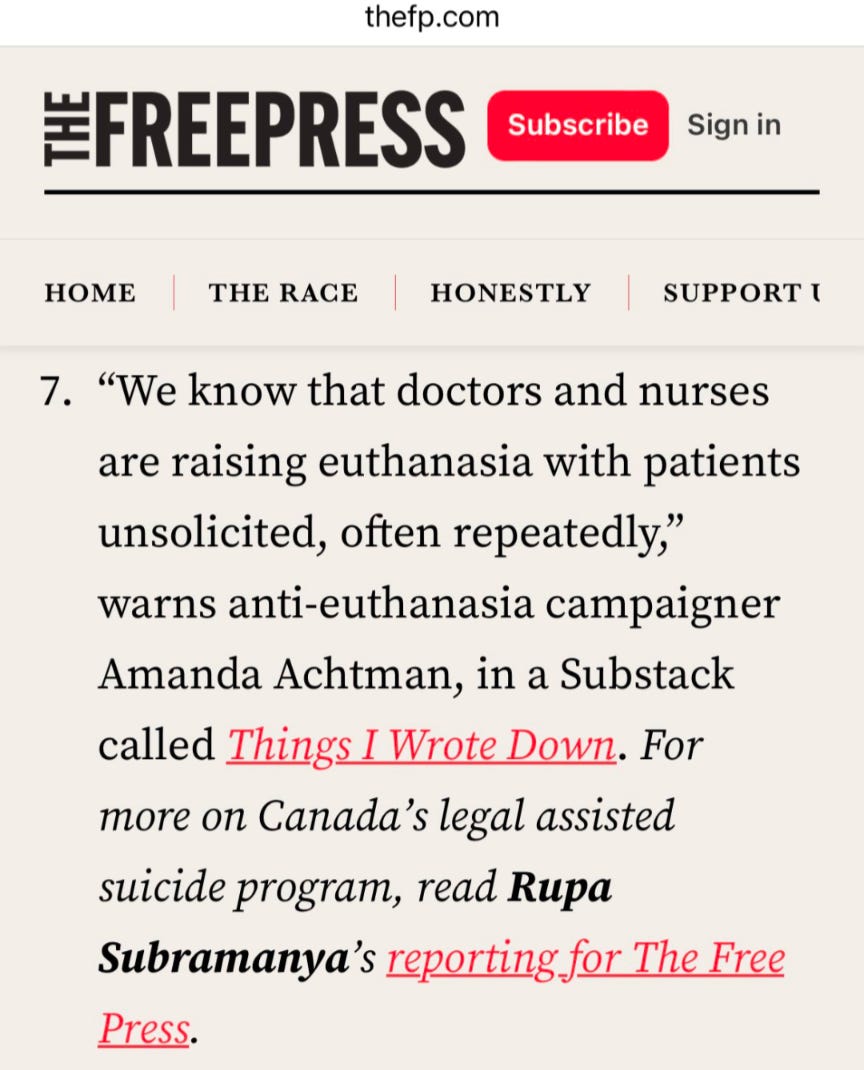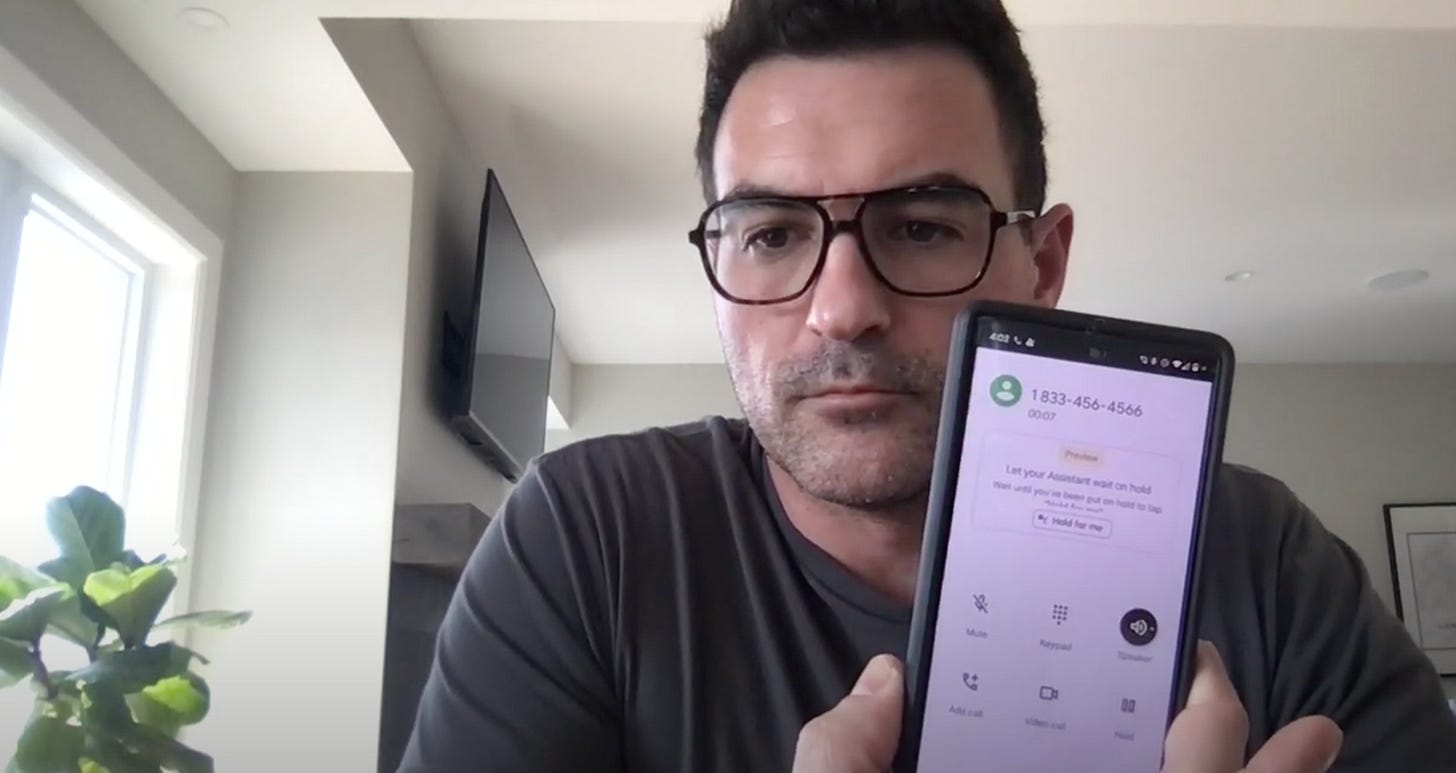Why I started to talk about MAiD (and why you should too).
Conversations about euthanasia are important as the procedure continues to expand in Canada.
Earlier this week, The Free Press linked to my interview with Amanda Achtman. The post got lots of attention (because The FP is one of the biggest new media platforms in the world, and because the interview includes the shocking revelation that “Doctors and nurses are raising euthanasia with patients unsolicited, often repeatedly”).
Now, other outlets are linking to the interview too. As a result I have a lot of new subscribers. If you’re new here, welcome!
My aim here on Things I Wrote Down is to share content that sparks hope. Conversations about MAiD can be difficult and confusing and don’t always feel hopeful. I’m sharing this article to encourage you that you have a voice and that you can join the conversation.
Like me, you may be no expert. But if you live in an area where euthanasia is legalized, your life will be impacted by it, and you’ll want some tools to talk about it. Especially if friends or family are offered it by health care professionals. Life in a time of euthanasia, that buzzy interview, will help you do just that.
And perhaps my story of stumbling into the issue itself (from awareness to unsophisticated advocacy), will give you a bit of courage.
Why I started to talk about MAiD
When I first learned that euthanasia was about to expand to include mental health as a sole condition (i.e. people struggling with depression could have a doctor end their life), I started to pay attention. Andrew Lawton’s personal article and Rupa Subramanya’s reporting really opened my eyes.
With my filmmaking brothers Matthew and Daniel, I helped produce a docuseries about the issue that looks at how MAiD came to be in Canada. We had questions, because we were shocked and alarmed. And suddenly, we were having conversations with courageous Canadians and some Americans, who were at the epicentre of the intellectual, legal, medical, moral, and ethical battle to stop MAiD expansion.
Here’s an exclusive clip from MAiD in Canada about how the expansion of euthanasia impacts the vulnerable, including people living with disabilities.
You can watch the 5-part series for free at UnveilTV.
We set up conversations. We turned the cameras on. Our 5-part documentary series streaming for free at UnveilTV helps people understand how MAiD evolved from being considered murder, according to the criminal code of Canada, to become one of the leading causes of death, now trending toward 1 in 10 of all deaths.
And we also started to hear from people whose family members had died in this way. Fathers, sisters, moms. The procedure is so available, normalized, sewn into the system.
I called Canada’s suicide hotline for advice about how to talk about MAiD
After a doctor suggested MAiD to a member of my faith community at a regular health check up, and then hearing about the fear that put in their mind (making a place of healthcare an unsafe, life-threatening space), I called Canada’s Talk Suicide hotline to ask for advice.
Short story: there was an awkward collision of the MAiD mandate and the suicide prevention mandate.
This call convinced me that Canadians—including suicide prevention experts—truly aren’t prepared for the fallout for assisted dying.
What a mixed message we’re giving as a society. And how much ground has been lost in the noble fight of suicide prevention! Not only is it easier to get MAiD then a family doctor in Canada. We denounce suicide for some, and push it on others.
And while there are advocates and voices who swear by the procedure as a dignified end-of-life plan, all about agency and choice, the stories we heard weren’t beautiful accounts of victory. They were quietly whispered stories of regret, remorse, confusion and shame.
People taken by surprise by the loved-one’s decision. Family members who felt helpless to intervene. Elderly people and individuals who live with disability worried their place of medical care is no longer a safe space where they can confidently get the treatment they desire to sustain or extend their life.
And then my aunt scheduled her appointment with a doctor at her assisted living home and scheduled her own death.
MAiD was less theoretical and it personally impacted my life. I wrote about grieving for a family member after they go through with assisted suicide here:
That, in a nutshell, has been my journey. With Matt and Dan, I’ve talked about the experience creating the documentary series on podcasts like The Post Millennial and The Andrew Lawton Show. I’ve talked to incredible and brave advocates across Canada. I’ve held my breath.
Why talking about MAiD matters
Through my unexpected experience of drawing attention to the reality of MAiD in Canada, I’ve learned that talking about it matters.
There are so many people much more able than me to discuss the issue, who understand all the nuances, who have way more credibility. I don’t need to be them. And you don’t need to be either.
But you have a voice. If you care about how normalized MAiD has become, then talk. Do it imperfectly. Maybe you’ll start by whispering about it like people now do with me. Learn as you go.
To quote Amanda Achtman, “We should do everything we can to prevent suicide and homicide within our communities.”
The lives of the people you love and the people around you matter. The safety and trust of someone in your community will be shattered when their doctor initiates a conversation with them about MAiD.
Let’s be ready to help and support them, and affirm the value of their lives.






